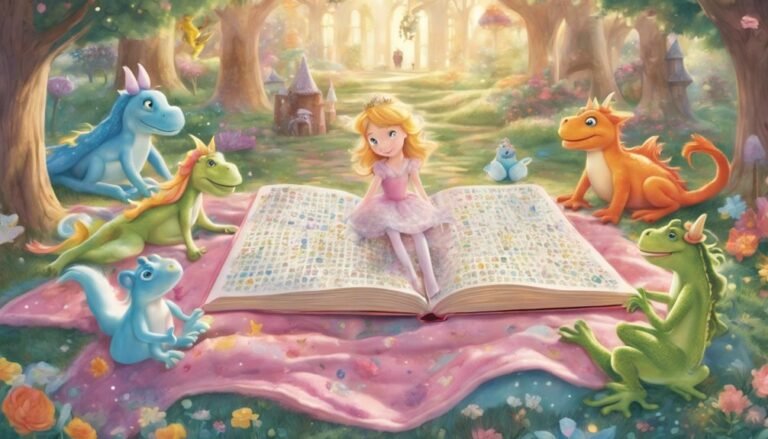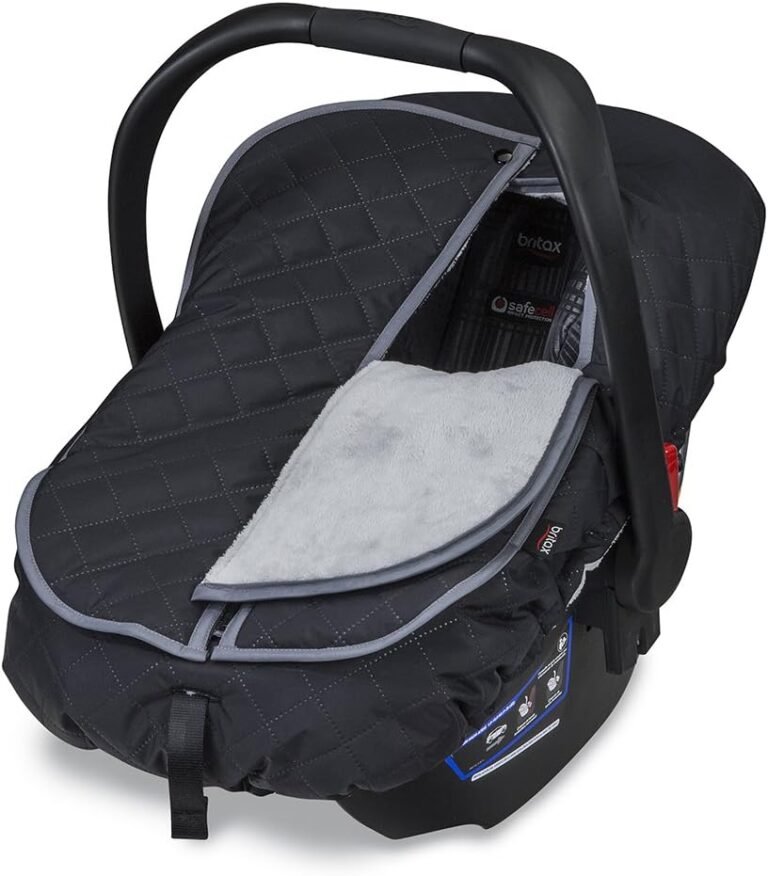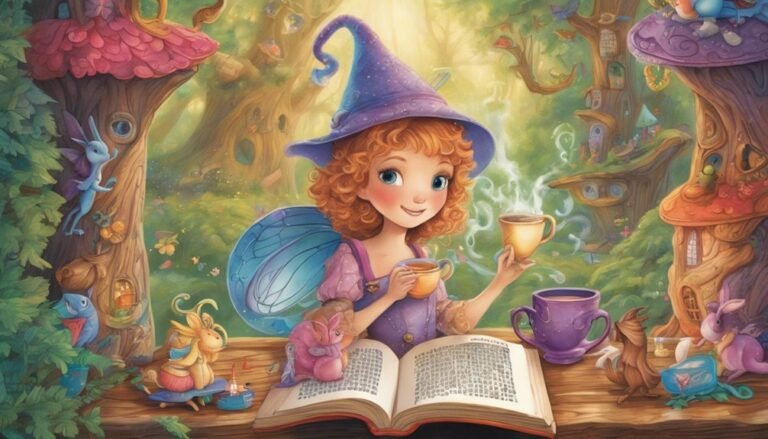How Word Search Puzzle Books Can Help Kids Learn Compound Words
If you want to help your child grasp the concept of compound words, consider the benefits of word search puzzle books. These engaging activities encourage kids to identify and combine words like "sunflower" or "footprint," reinforcing their understanding in a playful way. This method not only makes learning enjoyable but also boosts vocabulary retention. Curious about how these puzzles can further enhance your child's learning experience? Let's explore the educational advantages together.
Key Takeaways
- Word search puzzles actively engage kids, enhancing their recognition and recall of compound words through repetitive exposure in a fun context.
- Completing puzzles fosters critical thinking and problem-solving skills as children strategize to locate compound words within a grid.
- Each successful word found reinforces the meaning and context of compound words, solidifying understanding and vocabulary retention.
- Customizing word searches to align with specific lessons targets vocabulary mastery, making learning more effective and relevant for children.
- Solving puzzles boosts children's confidence and self-esteem, encouraging them to take on more complex language challenges in the future.
Understanding Compound Words: A Simple Explanation
Compound words are fascinating building blocks of language that combine two distinct words to create a new meaning. You can explore compound word examples like "toothbrush" or "basketball" to see how they function.
When teaching these concepts, consider using engaging teaching strategies that encourage kids to break down words into their components. For instance, you might've them draw pictures representing each part of a compound word, reinforcing their understanding through visual aids.
Incorporating word search puzzles can also support this learning by reinforcing recognition of compound words in a fun way. By utilizing these methods, you'll empower students to grasp the concept of compound words and enhance their vocabulary skills effectively.
The Educational Benefits of Word Search Puzzles
Building on the understanding of language structures, word search puzzles offer a playful yet effective way to enhance children's vocabulary and cognitive skills.
These puzzles encourage word recognition, allowing kids to identify and recall compound words effortlessly. As they search for hidden terms, they're not just having fun; they're engaging in cognitive development that strengthens their problem-solving abilities and attention to detail.
Research shows that such activities improve memory retention and critical thinking, essential components for academic success. Additionally, by repeatedly encountering compound words, children can internalize their meanings and uses, fostering a richer linguistic environment.
Incorporating word search puzzles into learning routines can be a strategic move toward mastering language while keeping the process enjoyable and interactive.
How Word Searches Enhance Vocabulary Skills
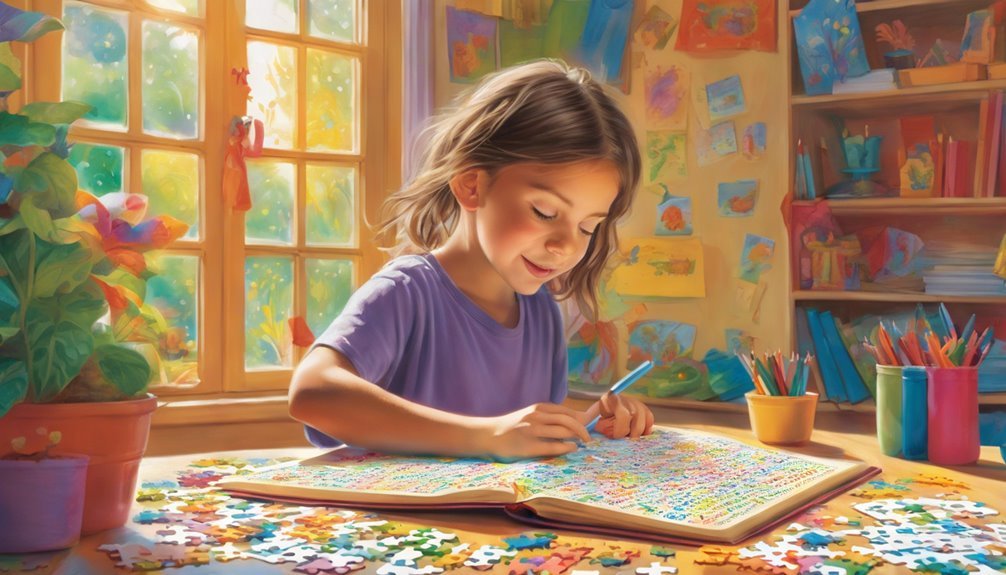
While searching for words in a puzzle, you're not just playing; you're actively enhancing your vocabulary skills. Engaging with word searches promotes vocabulary expansion, as you encounter various terms that may be unfamiliar. Each time you find a word, you're reinforcing its meaning and context, which boosts language retention.
Research shows that repeated exposure to words solidifies your understanding, making it easier to recall them later. As you immerse yourself in these puzzles, you develop a deeper connection to language, sharpening your cognitive abilities.
Moreover, the challenge of finding compound words encourages critical thinking and problem-solving, essential skills for mastering vocabulary. So, dive into those puzzles, and watch your vocabulary flourish!
Engaging Kids Through Interactive Learning
Interactive learning captures kids' attention and keeps them engaged, making it a powerful tool in education. By incorporating interactive activities like word search puzzles, you can turn the process of learning compound words into fun learning experiences.
These puzzles challenge children to think critically and connect words creatively, fostering their cognitive development. Engaging kids in this way not only enhances their vocabulary but also encourages them to take ownership of their learning. As they search for words, they become more invested in the material, which promotes retention and mastery.
Strategies for Solving Word Search Puzzles
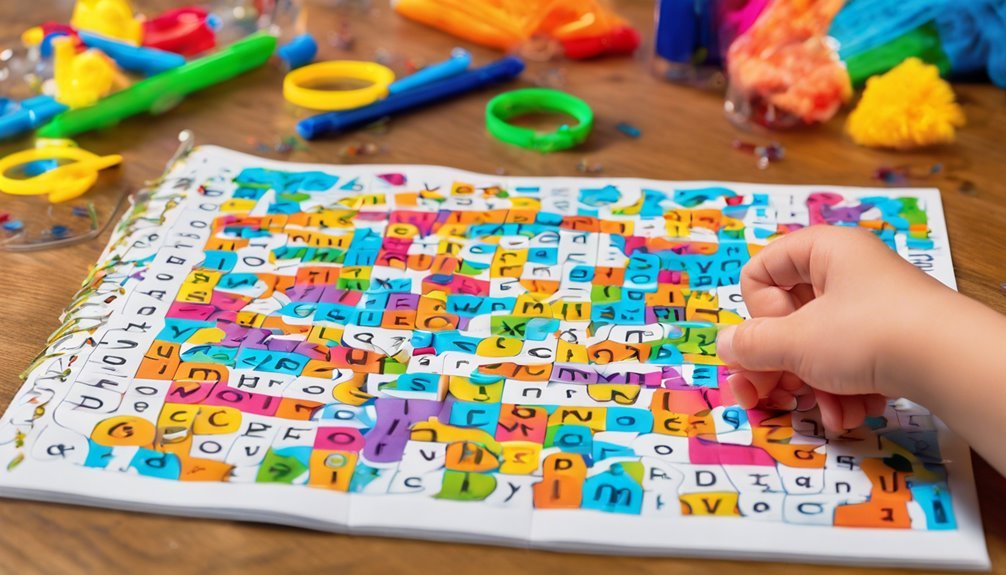
To successfully tackle word search puzzles, it's essential to employ effective strategies that enhance your problem-solving skills. Start by scanning for word patterns; this can help you quickly identify familiar combinations.
Next, use puzzle techniques like breaking down the list of words into smaller chunks. Focus on the first letter of each word to guide your search. You can also circle or highlight completed words to keep track of your progress, which builds momentum.
Additionally, consider searching in different directions—horizontally, vertically, and diagonally. These strategies not only increase your efficiency but also boost your confidence as you master the art of solving puzzles.
With practice, you'll find that your ability to navigate word searches improves significantly.
Incorporating Word Searches Into the Curriculum
Incorporating word searches into the curriculum can significantly enhance students' learning experiences, as they engage critical thinking and reinforce vocabulary retention.
By utilizing word search integration, you create an interactive learning environment that promotes active participation. These puzzles not only captivate students' attention but also encourage them to explore compound words in a fun, memorable way.
Research shows that such curriculum enrichment methods improve vocabulary mastery and comprehension skills. You can introduce word searches in various subjects, making connections between disciplines and reinforcing concepts.
Additionally, customizing these puzzles to align with lesson objectives allows for targeted learning. Embrace this approach to foster a dynamic classroom atmosphere where students thrive and develop essential language skills.
Tips for Parents to Encourage Learning at Home
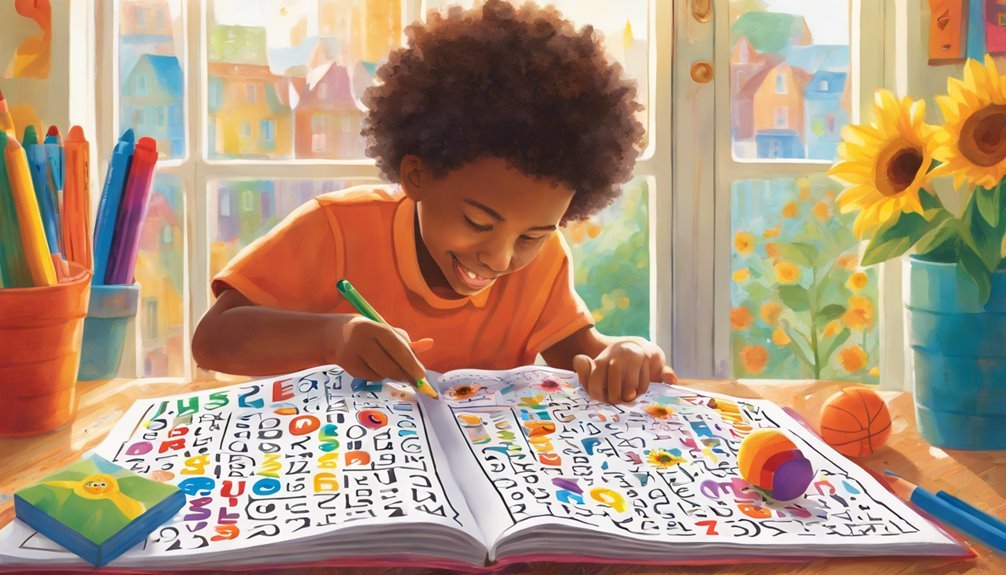
While many parents recognize the importance of educational activities at home, finding effective ways to encourage learning can be challenging. One powerful method is to engage in creative learning together. Set aside time for word search puzzles to boost your child's vocabulary.
Here's a simple table to guide your involvement:
| Activity | Materials Needed | Learning Outcome |
|---|---|---|
| Family Word Search | Puzzle book, pencils | Compound word recognition |
| Story Creation | Paper, markers | Vocabulary expansion |
| Daily Vocabulary Game | Flashcards | Memory enhancement |
| Interactive Reading | Books | Comprehension skills |
| Puzzle Collaboration | Shared puzzle book | Teamwork and bonding |
Your parental involvement is crucial; it fosters a love for learning that lasts a lifetime.
The Role of Visual Learning in Language Development
As children encounter new words and concepts, visual learning plays a crucial role in their language development.
Visual aids such as images, diagrams, and word search puzzles enhance language acquisition by providing concrete representations of abstract ideas. These tools allow kids to make connections between words and their meanings, reinforcing their understanding.
When children can see and engage with the material visually, they're more likely to remember and use new vocabulary in context. Incorporating visual elements into learning experiences not only makes the process more enjoyable but also supports various learning styles.
Creating Custom Word Search Puzzles for Practice
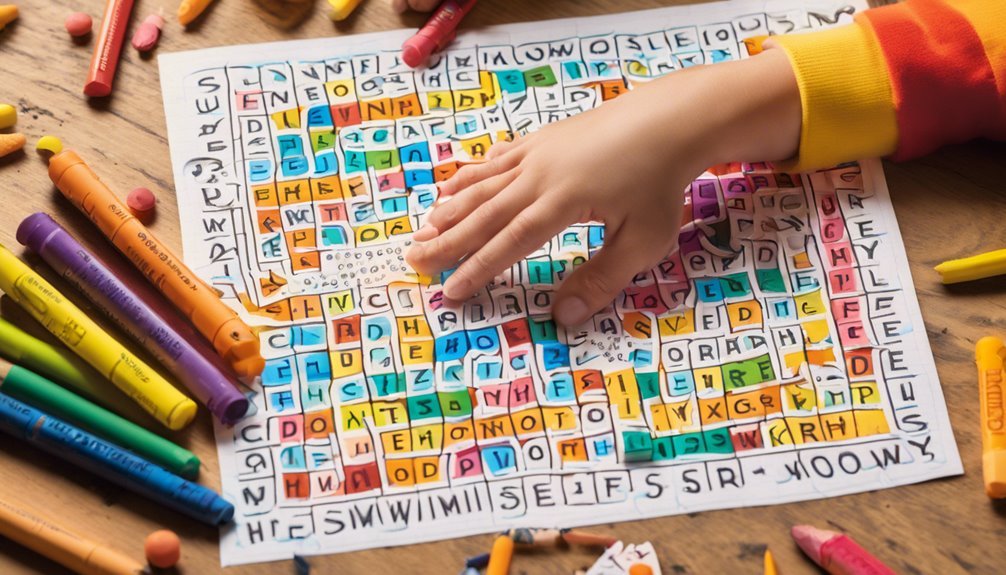
Creating custom word search puzzles can be a fun and effective way to reinforce vocabulary skills for kids. By tailoring puzzles to your child's interests, you can enhance their engagement and learning.
Here's how to create your own:
- Select custom themes: Choose topics your child enjoys, like animals, sports, or fairy tales. This relevance boosts motivation.
- Adjust puzzle difficulty: Consider your child's skill level. Start with simpler puzzles and gradually increase the challenge as they improve.
- Incorporate compound words: Include pairs that form compound words, helping kids make connections between words and their meanings.
Celebrating Success: The Impact of Achieving Word Search Goals
Achieving goals in word search puzzles fosters a sense of accomplishment that can significantly boost a child's confidence and motivation. When kids successfully complete a puzzle, they're not just finding words; they're celebrating milestones that reinforce their learning journey.
Each solved puzzle serves as a tangible marker of progress, helping them recognize their skills and improvement. This process of celebrating success plays a crucial role in fostering confidence, as every achievement, no matter how small, contributes to a positive self-image.
Frequently Asked Questions
What Age Group Is Best for Compound Word Puzzles?
The best age group for compound word puzzles is typically around preschool to early elementary school, as kids hit key learning milestones during this time.
You'll find that children around ages 4 to 7 are eager to explore language and develop their vocabulary. Engaging them with compound word puzzles helps solidify their understanding while making learning fun.
As they master these puzzles, you'll see their confidence and skills grow tremendously.
How Can I Make Word Searches More Challenging?
To make word searches more challenging, you can incorporate creative word placements by arranging words in unusual orientations or overlapping them.
Consider designing themed word searches where the words relate to specific subjects or interests, like animals or seasons.
You could also increase the grid size or add more words, making it a true test of skill.
Are There Online Resources for Printable Word Search Puzzles?
Did you know that over 70% of teachers use online resources for supplementary learning materials?
If you're looking for online puzzle resources, you've got plenty of options. Many websites offer free printable worksheets featuring word search puzzles on various topics.
Sites like Education.com and Teachers Pay Teachers provide a range of difficulty levels, so you can easily find puzzles to match your needs.
Dive in and start exploring these valuable resources today!
Can Compound Word Puzzles Help With Spelling Skills?
Yes, compound word puzzles can significantly boost your spelling skills.
By engaging with these puzzles, you're practicing spelling strategies that reinforce your understanding of word formation. This not only enhances your vocabulary but also helps you recognize patterns in spelling.
As you solve these puzzles, you'll become more confident in your abilities and improve your overall language proficiency.
How Often Should Kids Practice With Word Search Puzzles?
To maximize the benefits of word search puzzles, aim for practice sessions three to four times a week.
This frequency helps reinforce learning and boosts retention. Regular engagement enhances problem-solving skills and vocabulary, making it easier for kids to master new concepts.
You'll notice improved focus and enjoyment as they progress. Remember, consistency is key, so make it a fun routine that keeps them excited and eager to learn more!
Conclusion
In the garden of language, word search puzzles act like sunlight, nurturing young minds as they discover the rich soil of compound words. By engaging in this playful quest, kids cultivate their vocabulary and critical thinking skills, watching their understanding bloom. As they connect the dots between familiar words, they're not just solving puzzles; they're building a foundation for lifelong learning. So, let your children explore this vibrant landscape, celebrating each small victory as they grow into confident language explorers.






